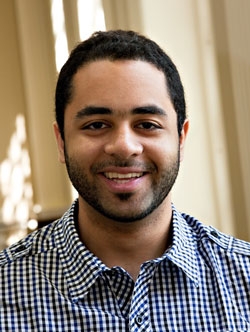
Anise Vance, a member of the Dartmouth Class of 2011, has been named a Beinecke Scholar, one of 20 college juniors nationally. The award, which supports the “graduate education of young men and women of exceptional promise,” provides $4,000 prior to entering graduate school and an additional $30,000 while attending graduate school. He joins Gabrielle Ramaiah ’10 and Jodi Guinn ’09 as the third Dartmouth student tapped for the scholarship in the past three years.
Vance, of Weston, Mass., is majoring in geography. “This is a huge honor,” he says, “both for the validation of my aspirations, and the financial support.” On the other hand, he notes, “it raises expectations. The call from the award committee came while I was working in the library; I phoned my parents, and then went right back to work.”
Issues of social justice, in the United States and globally, engage Vance. He traces his drive to ask questions about who lives where—and what results from that mix of space and identity—to his childhood “growing up all over the place”: Vance attended school in Kenya, Botswana, and Egypt. Growing up, as he calls himself, “a mixed race child of an Iranian mother and an African American father,” he was aware that the perceptions of others were often linked to one’s environment. This understanding has formed the basis of his research thus far.
He found a home for his interests in Dartmouth’s department of geography, and a well-matched advisor in Richard Wright, professor of geography and Orvil Dryfoos Professor in Public Affairs.
“My current research for my senior thesis as a Mellon Mays Fellow investigates the causes of and mechanisms by which residential segregation continues to plague urban centers and their populations,” he reports. “Using a variety of methods, including ethnographic research, census-data analysis and structural examination of lending and real estate practices, I hope to provide a comprehensive investigation of African American segregation in my father’s hometown of Hartford, Connecticut.”
As a graduate student, he intends to conduct research on four cities (Boston, New York City, Philadelphia, and Washington, D.C.), and to investigate the sources and effects of segregation on communities of differing races. He will be applying to PhD programs in sociology and geography, with a view towards a career that can blend work “in and out of academia: teaching and research but also practical work with NGOs.”
Vance advises fellow students to “find a mentor, and make use of our incredible access to faculty. Be passionate not just about the end-point of your studies but the process as well; it’s about loving what you’re doing right now.”
The Beinecke Scholarship Program was established in 1971 by the Board of Directors of the Sperry and Hutchinson Company to honor Edwin, Frederick, and Walter Beinecke. The Board created an endowment to provide substantial scholarships for the graduate education of young men and women of exceptional promise. Since 1975 the program has selected more than 430 college juniors from 100 different undergraduate institutions.
More information about the Beinecke Scholarship can be found on Dartmouth’s National Scholarships/Fellowships website.
